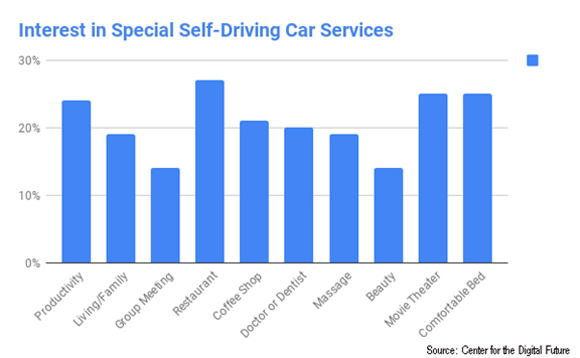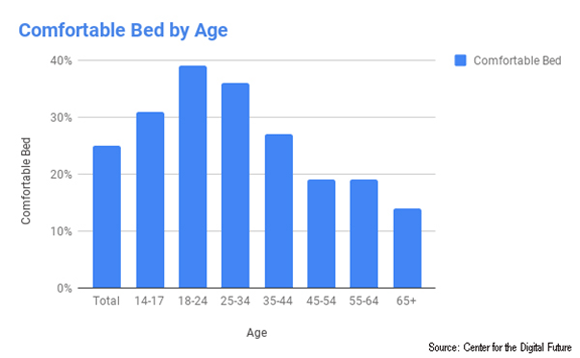In the Center’s Future of Transportation project, we’ve seen that the impending arrival of self-driving cars has implications far beyond getting people out from behind the wheel.
For example, we asked our respondents if they’d be interested in special kinds of self-driving cars that featured on-the-go services like a meeting room for productivity, a living room for the family to lounge in, a mobile restaurant or movie theater, or a comfy bed instead of a hotel:

Zooming in on the comfortable bed example by age, we see more than 10 percentage point increases of interest among Americans aged 18 to 34 over the average.

This should be alarming to hotel companies.*
The future of retail
Beyond creating mobile experiences that transform a commute into more productive or pleasant time, self-driving cars also have the potential to change more place-based retail experiences by removing the hassle and cost of transportation from customers.
The owners of every bar, restaurant, coffee shop, movie theater, boutique, medical practice, supermarket, shopping mall, and warehouse in this country should be asking themselves, “what happens to my business if getting there is as easy as ordering something on Amazon?”
It’s not a theoretical question.
Just last week, in a CNET interview with Tim Stevens, Waymo CEO John Krafcik described conditions in which self-driving cars might move people around at no cost:
“Business are saying to some of the users ‘Hey, we’ll pay Waymo to bring you to the mall, or to this destination, or to the hotel.’” Krafcik told me. “I think this is a really interesting future business possibility for Waymo.”
You don’t have to squint too much to see how that idea, a commercial entity incentivizing you to select it as your destination, looks a little like promoted search results. The parallel is not lost on Krafcik: “Google is our sister company, and there are some analogies there to the search model, but with Waymo it’s the ultimate manifestation of this. We can work with businesses who want to bring shoppers to their location, and we can bring them right there in a way that the shopper doesn’t have to pay.”
If Waymo succeeds in doing this, it would have profound implications for the future of local businesses and retail in general.
What’s Waymo and how would this work?
Let’s back up.
Waymo is the self-driving car business owned by Alphabet. It started life as Project Chauffeur, part of Google (which transformed into Alphabet three years ago). Krafcik is a long-time U.S. auto executive recruited by Google to run its self-driving car business in 2016.
Krafcik is saying that in addition to shuttling people around, Waymo could become a promotional platform for local businesses. If, say, a comedy club was concerned that not enough people were coming to that week’s open mike night, it could subsidize people’s rides to get them there and fill the room.
It is a simple fact of human existence that most of the quotidian decisions we make aren’t actually all that important. If I want to meet a friend for lunch, then what’s important most of the time is seeing my friend rather than where we dine.
That means that in the time between deciding to have lunch with my friend and leaving for the lunch itself, there’s a moment where a local business could offer to pick me up and drive me there, channeling my dollars in their direction.
Subsidizing rides may sound prohibitively expensive, but according to financial modeling performed by Lawrence Burns and Bill Jordan, self-driving cars may reduce the cost of transportation in the U.S. from $1.50 per mile to 20 cents per mile, making the rides dirt cheap: if the restaurant were within five miles of my house the ride would cost less than a dollar. (See Burns’ remarkable new book, Autonomy, for details.)
Even before self-driving cars pull up to the curb, savvy new transportation companies like Freebird Rides are experimenting with subsidized rides to paying businesses, and their costs should plummet in the near future.
But wait, there’s more
By itself, Waymo as a promotional platform is interesting, but if you add the Google Assistant** to the mix then things become fascinating.
Let’s say you have a Google Home smart speaker in your kitchen, or you have an Android phone with the Google Assistant always listening. If you live with another person (or talk to yourself) and say, “I’d like Chinese food tonight,” then the Assistant might cough discreetly. “Szechuan Kitchen can pick you up and bring you home after,” the Assistant would say. “Would you like me to make a reservation?”
While Alexa is trying to move commerce onto its platform so that Amazon can ship goods to you, the power duo of Waymo and its sister company Google might restore time, attention and dollars to local businesses.
The transportation revolution is just beginning.
* See this column by Center founder Jeffrey Cole for more on the future’s moving hotels.
** See our recent Sharpest Edge: Digital Assistants mini-report for much more on how digital assistants are likely to change our lives.
[Cross-posted on the Center site and elsewhere.]
Leave a Reply